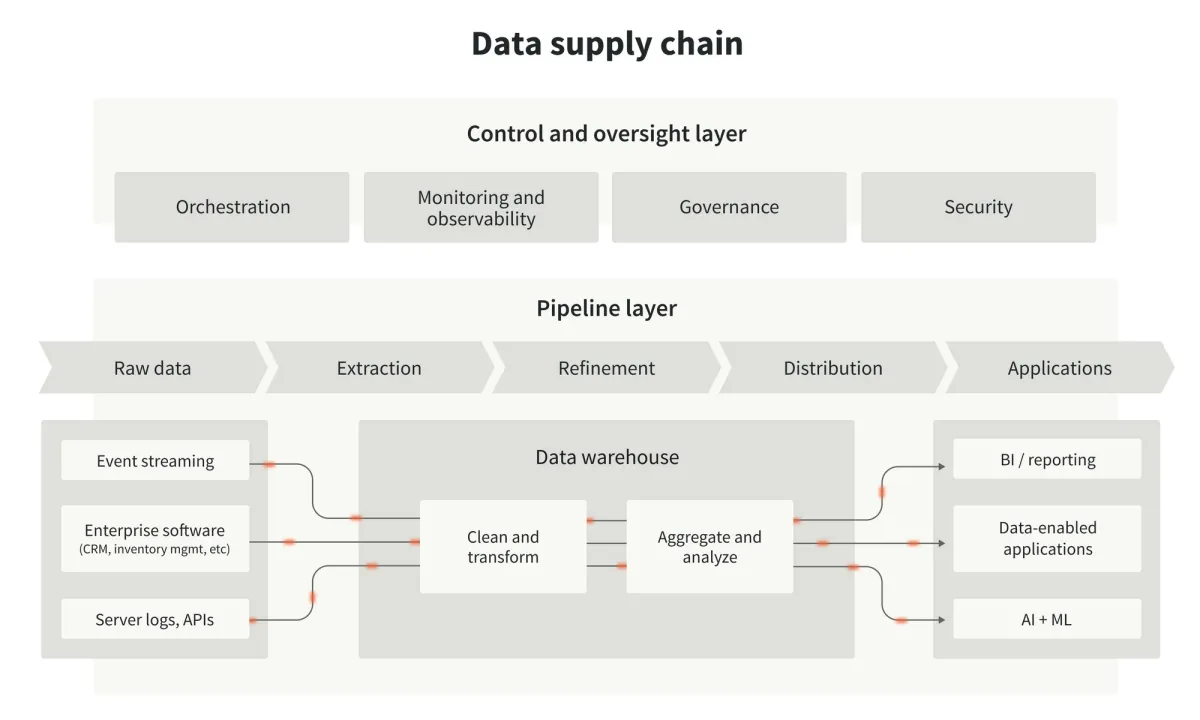The Innovation Fund has invested in Immuta, the leading provider of governance and security software for modern data infrastructure. This investment aligns with the thesis we shared on the broader data infrastructure space, fitting into the crucial “command and control layer” that spans the data refinement process.
Note: Not long after our investment, Immuta announced it had received an investment from the venture capital arm of Databricks, further deepening their existing partnership. We view this exciting development as a strong signal of the future potential of the platform and its position as a market leader in the space.

Founded by a former U.S. Army intelligence officer, Immuta provides a software platform to enable companies to “get the right data to the right people so they can build more data products, collaborate, share data, and create new revenue streams.” Before diving into how Immuta does this, it’s worth underscoring why this problem matters. Unfortunately, the headlines are filled with examples of companies failing to solve this problem. The wrong person was able to access the wrong data, leading to data breaches, sensitive IP theft, or ransomware incidents. For instance, most company employees should not have access to the names and addresses of customers. Global companies must follow different rules for different data for different countries.
There is also a hidden opportunity cost that many companies bear that may be even greater than the examples that make news. The fear of exposing data to unauthorized parties pushes companies to take a heavy-handed approach that can limit their team’s ability to fully leverage their data. This hesitation can hinder product development, obscure valuable insights, obstruct solutions to customer problems, and affect their top and bottom lines. So companies are caught between the desire to deliver better outcomes through data and avoiding ending up on the front page with an embarrassing data breach.
So how does Immuta help companies balance security with utility? It comes down to three core components: discovery, security, and ongoing detection.
Discovery
Immuta allows customers to easily scan, classify, and tag sensitive data across their data infrastructure estate. Sensitive personal information like credit cards, social security numbers, and health records must be identified and categorized with the appropriate risk level. Identifying and tagging sensitive data are prerequisites to handling it with care, which leads to the next piece of the Immuta platform.
Security
Immuta’s security module builds on the sensitive data in the discovery module to allow companies to build and apply security and access controls across their entire data infrastructure. This ensures that only those that are required to and capable of handling sensitive data are able to access it.
There’s also a significant regulatory component to these limits. Immuta makes it easy to apply granular access control based on specific data types, use cases, and the internal consumer. Large organizations have complex data infrastructure that spans multiple data platforms like Snowflake, Databricks, and Google BigQuery, as well as geographies with region-specific requirements, exemplified by the EU’s General Data Protection Regulation (GDPR). Applying one policy to one platform in one region is manageable, but the complexity can grow exponentially with multiple policies for each additional user, data type, product, platform, and country. Immuta integrates with all the major data platforms so that customers can write data policies once and apply them across their entire business.
Detection
Immuta's detection module constantly monitors data access and usage across a company’s entire data infrastructure. This proactive, always-on approach ensures that companies understand who is accessing what data and how they are using it. Immuta gives businesses the ability to catch and rectify any potential security or compliance issues before they become problems. Immuta also identifies potential blindspots in security protocols to avoid future incidents and makes data easily auditable for compliance or remediation.
Integrations
Deep integrations across the data ecosystem allow Immuta to deliver a unified experience for customers. They have integrations with all the major cloud providers and the key cloud data warehouse providers we identified in our sector overview. Not long after the Innovation Fund invested, Immuta received an investment from Databricks’ venture arm in conjunction with a deepening of their partnership. They’ve also received investments from other strategic partners like Snowflake, Okta, and ServiceNow.
Immuta is addressing a critical need in today's digital economy. With data breaches on the rise and increasing regulatory scrutiny, the need for sophisticated and efficient data governance and security access software is only growing. Immuta is a market leader in this, providing a solution that both protects sensitive data and enables companies to fully leverage their data assets. Immuta’s solution caters to companies with sophisticated data infrastructure and skews toward customers in highly regulated industries, such as major banks and healthcare companies. We see meaningful growth potential ahead of Immuta with sophisticated requirements becoming table stakes for companies as advanced data capabilities become increasingly prevalent.
We’re excited to invest in Immuta’s next stage of growth, and expect to share more updates on their progress. If you’re interested in learning more about their offerings, you can explore them here.
